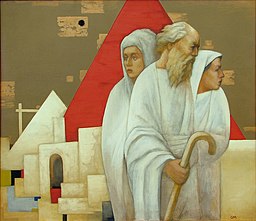Network of Gifts
Lenten Sunday1 (17 Feb 2013)
Homily of Fr. Paul Panaretos, S.J.
Entering the first week of the “season marked out in a special way by the mystery of our redemption and of the days that lead up to the paschal feast,”1 the scripture readings highlight confession. Christian churches exist to confess in word and deed. We Catholics may limit to confess to naming sins in the Sacrament of Reconciliation. The readings remind us that confess has an older, wider, public meaning: to express faith; to own it; and to affirm it by our actions. How is praising God confessing? By worshiping God for God’s mighty acts and allowing ourselves to be transformed by them.
 The bible contains nuggets of con-fession, of praising God. We heard the core nugget of the Hebrew bible. Prophet Moses2 taught the people: God brought us out of Egypt with his strong hand and outstretched arm, with [stunning] power, with signs and wonders. Their exodus was no human project of escape but God’s graciousness, and it filled them with awe.
The bible contains nuggets of con-fession, of praising God. We heard the core nugget of the Hebrew bible. Prophet Moses2 taught the people: God brought us out of Egypt with his strong hand and outstretched arm, with [stunning] power, with signs and wonders. Their exodus was no human project of escape but God’s graciousness, and it filled them with awe.
Paul’s letters contained nuggets of confession, too. We heard a famous one: confess with your mouth that Jesus is Lord and believe in your heart that God raised him from the dead [and] you will be saved. No power, signs and wonders are greater than God freeing Jesus from his passion and death by raising him from death to indestructible life! That forms the confession each person is expected to make at baptism.
Our baptized lives are confessing journeys. They are not geographical ones but involve our hearts. They involve growing closer to Jesus, our model of praising God, our model of friendship with God. In our honest moments we know we are tempted to let our friendship with our triune God cool, to let our desire to praise God for our blessings shrink and to limit praising God in action to time in church.
Praising God confesses something so easy to ignore: all we are and have are God’s gifts to us. Natural abilities, particular talents, sacramental sharing in God’s life, personal graces enjoyed: all are gifts of God. To recognize that does not demand withdrawing from the world to praise God. It means, instead, to engage the world, aware that creation and personal existence are a network of gifts of which we are stewards.
.jpg/256px-Christ's_temptation_(Monreale).jpg) In his time in the wilderness Jesus demonstrated focused commitment to God, creation and his mission. He clung single-heartedly and lovingly to God. Jesus did not let hunger sway him: One does not live on bread alone. We let things as well as food sway us. Jesus did not let power rule him: God alone shall you serve. Power and glory often lure us. Jesus did not demand the Creator do something sensational for him: You shall not put the Lord, your God, to the test.
In his time in the wilderness Jesus demonstrated focused commitment to God, creation and his mission. He clung single-heartedly and lovingly to God. Jesus did not let hunger sway him: One does not live on bread alone. We let things as well as food sway us. Jesus did not let power rule him: God alone shall you serve. Power and glory often lure us. Jesus did not demand the Creator do something sensational for him: You shall not put the Lord, your God, to the test.
Lent does not merely remind us of Jesus’ single-hearted commitment to God. Lent invites us to renew our union with Jesus in baptism and help others prepare for it. Baptism joined us with Jesus and began our share in his Spirit, our power to confess our commitment to God in deed as well as word. Lent frees us to align our priorities as friends of Jesus; to live a more single-hearted commitment as his disciples today.
In your daily 15 minutes with Jesus this week
- Pause and desire to be aware of our Triune God.
- Ask saints and angels to present you to Jesus.
- Chat with Jesus: confess your wonder that Jesus created and redeemed you; thank Jesus for equipping you with your talents; filling you with your desire to follow him; and blessing you richly.
- Ask Jesus for grace to follow him more closely during Lent and beyond it.
- Close saying slowly the Lord’s Prayer. Jesus gave us his prayer to keep us rooted in him and to guide our Lenten journey to what is more true, more humane and more godly.
Link to this homily’s Spiritual Exercise
___________
- Leo the Great, Lenten Sermon 6.
- Biblical tradition considered Moses the first and the greatest prophet as witnessed by Deuteronomy 34. 10-12. From it grew the expectation of a messiah like him.
________________________________________________________________
Wiki-image by Podvinskij depicting the Exodus used by CC BY-SA 3.0. Wiki-image of Christ’s temptation released in the public domain.
No comments:
Post a Comment